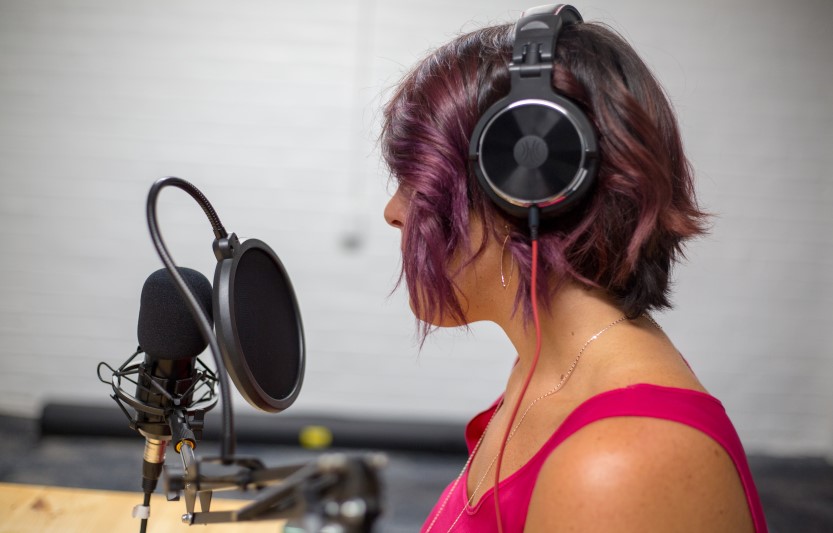
Today we’re going to give you simple vocal exercises to improve your singing. In this world of endless information, it can be a bit difficult to separate the good, the bad, and the best.
In this article, we have proven exercises that have been successfully employed by singers all over the world.
This guide will let you get right down to business by avoiding unnecessary frustration to start improving today. Nonetheless, remember that just like any other musical endeavor, singing requires practice and dedication. One fantastic tool in your journey to becoming a better singer is Roadie Coach. This wonderful device can work in tandem with the exercises provided here to keep you accountable at every step. Coach offers personalized feedback and exercises to help you improve, as well as a high-quality recording feature that permits you to get in-depth insights into your progress. Without further ado, here are the vocal exercises to improve your singing.
Slow breathing
There is no singing without breathing. As a matter of fact, a good breathing technique is imperative in order to sing well.
Start by inhaling slowly and then slowly exhale while engaging your diaphragm muscles. The idea is to exhale as slowly and steadily as possible.
This exercise is great for learning to manage your breathing in a consistent and controlled way. It may be hard at first, but keep working at it until your inhales and exhales are slow, consistent, and relaxed.
Breathing “S”
Another great exercise is to inhale naturally, and then exhale forcefully while pronouncing the letter “S” continuously. The idea here is not to push hard but to do it effectively. The “S” sound should be precise and consistent. In other words, make sure that the sound is as strong in the beginning, middle, and end of this exercise.
Watch out for running out of air towards the end of the exercise. If that happens, make a mental note of it and just keep trying it until you achieve consistency.
Remember that good breathing is a cornerstone of good singing. The magic word here is consistency. Learn to breathe effortlessly and consistently so you can use your entire breathing apparatus in your favor.
Lip thrills
Lip thrills are arguably the most popular and helpful exercise for singers. They are quite effective and are used by beginners and professionals alike. Although they may sound weird at first, their effectiveness has been proven.
Normally, they are utilized at the beginning of a singing session, or when a quick warm-up is necessary. This is because lip thrills are great for loosening up your vocal cords and preparing them for more exercises and singing. It is important that you breathe well and perform the lip thrill consistently from beginning to end.
There’s plenty of information on the web regarding lip thrills, and watching some of them will help you better understand how this fantastic vocal exercise should be executed. Try to use scales when doing lip thrills, as this will give you context and will train your ears as well.
Scales and arpeggios
Practicing scales and arpeggios in all sorts of different ways is one of the most effective exercises for improving your singing. You can start with the major scale and its arpeggios. For instance, in the case of a C major scale, the notes would be C D E F G A B. The arpeggio is just the first, third, and fifth note of the scale, in this case, C E G.
Try to practice major and minor scales in different syllables, as well as lip thrills. This will help with various aspects like your tuning, endurance, and overall voice agility.
The way to practice scales is to start on a range that you are comfortable with. After doing the first scale, then move up by half a step to cover your entire singing range.
Sing songs
It seems so obvious, but singing exercises go well beyond scales, lip thrills, etc. In order to get better, you also need to sing songs. This way you will inevitably run into challenges to work on.
Needless to say, a good singing teacher can be of great help in dealing with those challenges. They can also recommend particular exercises based on the specific challenges you face. After all, no two persons are alike, and you will face a unique set of issues to work on in order to improve.
It is important to sing songs and develop your repertoire. Make this point an important part of your daily singing exercises to put everything you work on into context.
Sing with your favorite singers
It is very important to emulate your favorite singers. Doing so will develop your criteria and help you become a better singer. Listen closely to what these singers are doing. Perhaps they are on chest voice, then on head voice, etc.
Think about what their range is, and what are the qualities that make their voices stand out. Is it raspiness? Perhaps a very powerful vibrato? How about a superior smoothness on the low end?
Record yourself singing
Few exercises are as revealing as this one. Granted, recording yourself can be discouraging but it is also tremendously helpful. By listening to your recording you will know precisely what you sound like. This is also a great way to track your progress over time.
Do this when practicing scales, arpeggios, and especially when singing a song. Take it a step further and keep a journal where you make notes on your progress.
Roadie Coach can help you here, as it will listen to your recording and give you feedback on how to improve.
These simple vocal exercises to improve your singing can go long way when used adequately. Remember, if you feel any pain or discomfort, stop and seek professional help.
Keep in mind that practicing daily is usually the best course of action for any musician trying to improve at their craft, and it is no different for singers.


